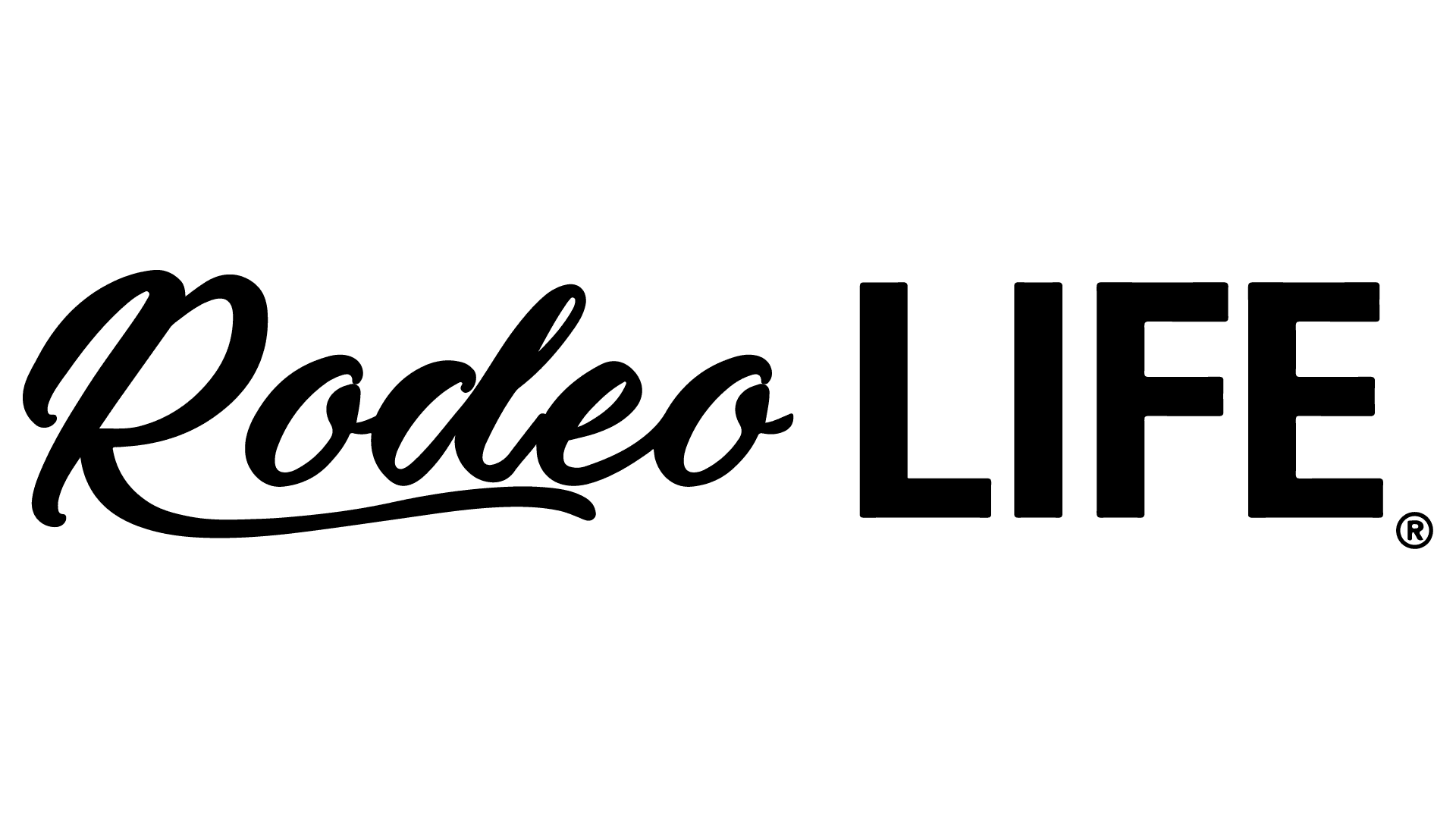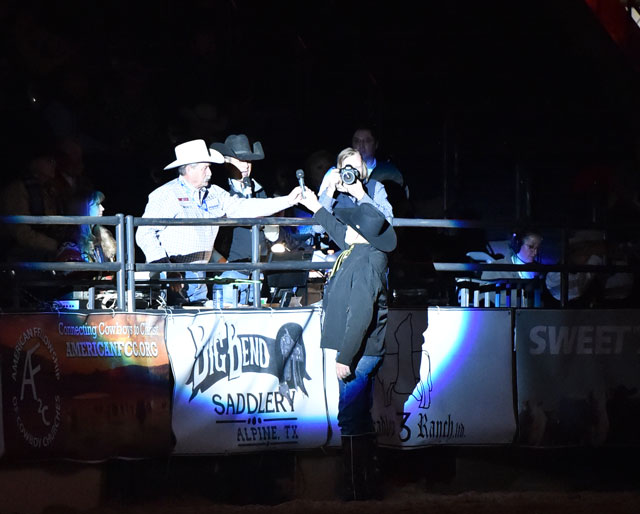9 Time PRCA Announcer of the Year
[ The best part of life is still to come:
“I haven’t gotten there yet.” ]
The rich, baritone voice is unmistakable. Step inside a rodeo arena, hear the voice, and without glancing at the announcer’s stand, you know who it belongs to.
Bob Tallman and his warm, personable approach to calling a rodeo has brought the action to millions of people at rodeo arenas across the U.S. and Canada.
The Nevada native, now living in Poolville, Texas, has been around cattle, ranching and rodeo all his life. He was born the first child of John and Irene Tallman in Orovada, Nevada, in 1947. His sister, Maryanne Tallman Smith is full of the same family try, and they were both raised on the family ranch. He remembers as a little boy, using a stick to sweep a patch of dirt clear, to draw pasture lines in it. His dad owned Tallman Lumber Co. in Winnemucca. Bob attended a one room school, but he’d rather be on horseback, in the middle of a thousand head of cattle, as the Tallmans ran their cattle in common with ten or fifteen other area ranches. Sometimes he and the other kids would fall asleep in the herd, with their stirrups tied together so they wouldn’t get bucked off.
John and Irene moved their family to town when Bob was ten years old, the first time the family had running water, flush toilets, and television. He thought it was great, Bob remembered, but it wasn’t long till the ranch called again. “I was back working for six dollars a day, as a buckaroo, driving a Farmall C tractor.”
Bob’s first love wasn’t rodeo. He tried high school football, but it wasn’t for him. At 5’1” and 105 lbs. as a freshman, he lasted for three days of practice. He excelled at golf, and could hit a ball 300 yards. But he loved rodeo cowboys, and he could rope, and that would prove to be a stepping stone towards his lifelong career of announcing. His second grade teacher and her sister, Tillie Boynton Genter and Jayne Boynton Angus, and their husbands, were the ones who got Bob started in rodeo in junior high and high school.
Another integral part of Bob’s young life was 4-H. He was a 4-H state champion horsemanship winner, on the back of a 900 lb. mustang he and a friend had roped, brought home, and broke. He and John DeLong were buckarooing in the pasture when they ran into a bunch of wild mustangs. Bob roped a “little bald-faced sucker,” loaded him onto the truck, took him home, and the next day put a saddle on him. The mustang became his 4-H horse, on which he won the title.
In college at Cal Poly State in San Luis Obispo, Calif., he roped collegiately, “but I wasn’t good enough, and I didn’t care,” he said. What he did care about was spending time with the other cowboys: Ned Londo, Bobby Berger, Dennis Reiners, Larry Jordan, Tom Castleberry, and many more. “They were my roommates, my partners, my buddies.”
He tried to ride bucking horses, too, attending Tuesday night practices where he’d get on eight or ten horses a night. Bob Robinson, the Canadian bull rider, who was helping with the practices, had advice for him. “Bobby, I know you want to be a cowboy, but you’d better find something else.”
It was at a rodeo in Fallon, Nev., in about 1969 where he was roping calves, when he told the stock contractor, “this announcer is pitiful. Can’t you find anybody else?” The contractor told him, when you’re done roping, tie up your horse and you do it. So he did, getting paid $100 a performance, and “I thought I’d never see another poor day,” he remembers.
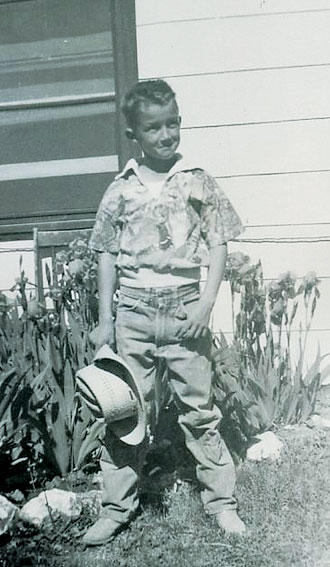
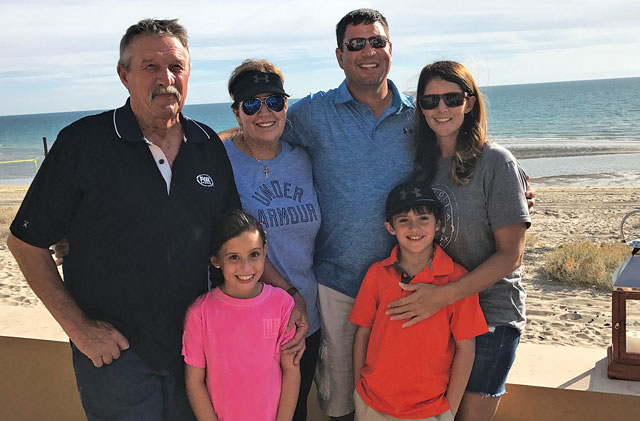
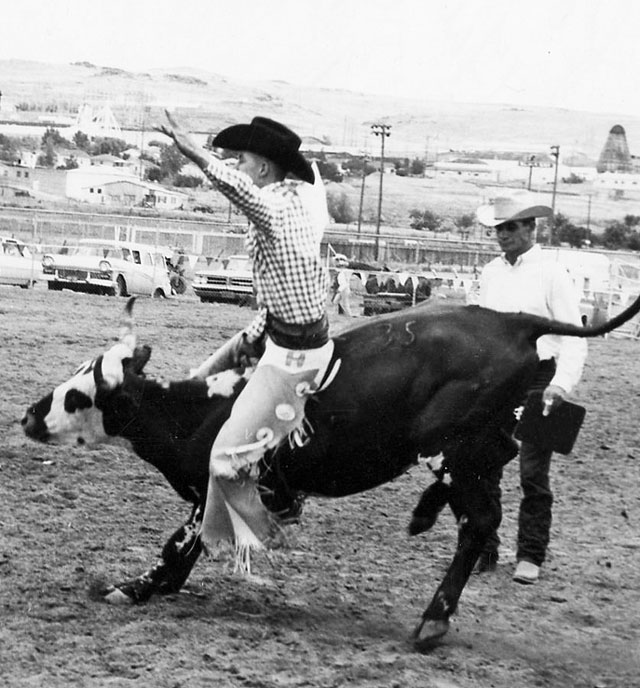
That fall, he announced rodeos for Corky Prunty, Diamond A Rodeos in Elko. By that time, he was married to Kristen, and as they drove to the rodeos, they would program their eight-track tapes, with songs by Marty Robbins and Anne Murray, so they were keyed up at the right spot for playing at rodeos. Bob’s pickup had speakers on top of the shell top camper, so he’d drive through town, announcing the rodeo was going on that day.
He was still working three other jobs: for his dad at the lumberyard, as a brake man on the Western Pacific Railroad, and driving freight truck for the Southern Pacific Railroad.
Announcing came naturally to Bob. He knew the contestants well; many of them were his friends, so he told stories about them. “I started building a fan base of friends and people,” he said.
In 1970, he headed to the PRCA convention in Denver, at the Brown Palace Hotel, in a white hat he bought from Cotton Rosser’s clothes store. He brushed elbows with legends in the rodeo business, contract people who were also at the convention to drum up business: Clem McSpadden, Leon and Vickie Adams, Tommy Lucia, Jay Harwood, Mel Lambert, and more.
But nobody would hire him, and money was in short supply. He and Vick Carmen, another announcer, in the mornings would cross the street to a café where coffee was a dime. At lunch, they’d order hot water and add ketchup and crackers to make soup. And in the evenings, they’d order a dinner and split it.
It was at the convention that Bob got his first break: Bob Cook, who, with Jack Roddy and Jack Sparrowk owned Rodeo Stock Contractors, Inc., asked Bob to work for them. On February 2, 1972, Bob moved to Clements, Calif., to work for RSC. The first week, his job was to break down truck tires. He helped gather bucking horses, getting on them to try them out. They “peeled the hide off me from the top of my ankles to my cheek bones,” he remembered.
He drove truck for RSC, got flank straps ready, fed livestock, packed panels, whatever he was asked to do.
All the while, he was living in his shell camper, showering and eating in the house with Canadian saddle bronc riding champion Enoch Walker and his wife Maggie who also worked for RSC.
The next year, Bob announced all of the RSC rodeos plus a few for Flying U Rodeo and Cotton Rosser, feeding livestock after the rodeo in his suitcoat. He worked the National Finals Rodeo in Oklahoma City for livestock superintendent Buster Ivory, from 5 am to midnight every day, for $15 day.
At the time, Kristen stayed in Winnemucca. She had a good job, and they weren’t certain where they would land after Bob’s time with RSC. When she did go on the road with Bob, “we sold everything and bought a truck,” Kristen said, “with a twenty-one foot travel trailer, and that’s what we spent the first five years in, living on the road.”
It wasn’t easy at the beginning. Kristen believed in her husband’s dream of being a rodeo announcer, but no one else did, including his parents. The only person besides his wife who urged him on was her dad.
In 1976, he was asked to announce the NFR with Jay Harwood, and “away we went,” Bob said of his career.
After that, his announcing career blossomed. Mike Cervi searched him out, asking him to announce the Phoenix Jaycees Rodeo, Denver, Houston, Albuquerque, Greeley, and more. He met announcing legend Hadley Barrett, and they worked several rodeos together, which “was the most magical match in the world,” Bob said. “I spent a few thousand days with Hadley Barrett, behind me, in front of me, beside me. He was about the first guy I worked with, side by side, he in the announcer’s stand, I a-horseback.”
At one point in his career, Bob worked every major rodeo in North America, from Florida to Alberta, California to the Northeast, from Houston to Calgary. In 1983, Bob worked 313 performances, keeping up the pace for years.
He had a twin engine 414 Cessna, and when he put sheets, towels and a pillow in the airplane, “that was the day it got worse,” he said. “Instead of going home more often, I went harder.”
When he wasn’t announcing rodeos, he was doing radio and television. Bob broadcast the NFR in Oklahoma City for many years; he was on John Blair Television, CBS Sports Canada, ABC’s Wide World of Sports, FOX Sports, the Great American Cowboy, the Wrangler Network online, and hundreds of television specials, videos, and voice overs.
He and Kristen had a daughter, Nicole, in 1974. Bob was at a rodeo in Spokane, Wash., when she was born, and he celebrated with Larry Mahan and his friends in Spokane. Gary Gist bought champagne, and Cindy Dodge wrote “it’s a girl” on Winston cigarettes. “We gave away cigarettes, and we drank the whole case of champagne,” Bob said.
Five days later, he and Mahan flew to Reno to see the baby. Mahan bought a dozen roses, and when they walked into the hospital, he told Bob, “you stay in the hall.” He handed Kristen the roses, and told Bob, “Ok, you can come in now.”
Throughout his career, he has announced the National Finals Rodeo twenty-three times, nine of them consecutively, more than any other announcer, and was voted the PRCA Announcer of the Year nine times (1982, 87, 97, 99-01, 04, 06, 17). He’s appeared in several films as a rodeo announcer, was the voice of the Wrangler Network online, and is a 2004 inductee into the Pro Rodeo Hall of Fame.
Bob credits the people he’s been around for his success, those who helped him get to where he is today, the committees and contract people he works with, the contestants, and the rodeo audiences as well. “It took me a long time to figure that part out,” he said. “It’s people God puts in your life, and you’re either manipulated by them, or you learn how to deal and get along with them.”
He paints pictures for the fans with his announcing, and he knows how to handle an audience. “You gotta take them right to the edge, but don’t push them over,” he said. “And when they’re just about full, don’t give them anymore. They’ll come back for more tomorrow.”
He says rodeo is a lifestyle, not a sport, and when people buy a ticket to a sporting event like football or baseball, they already know something about it because they have played it. With rodeo, most of the fans have not done it, “so you have to let them taste it through your eyes, and you have to let them feel it by your inflection,” he said. “It isn’t always about winning, but having a better horse in the roping, understanding what an inside spur is in the barrel racing, understanding dedication and preparation.”
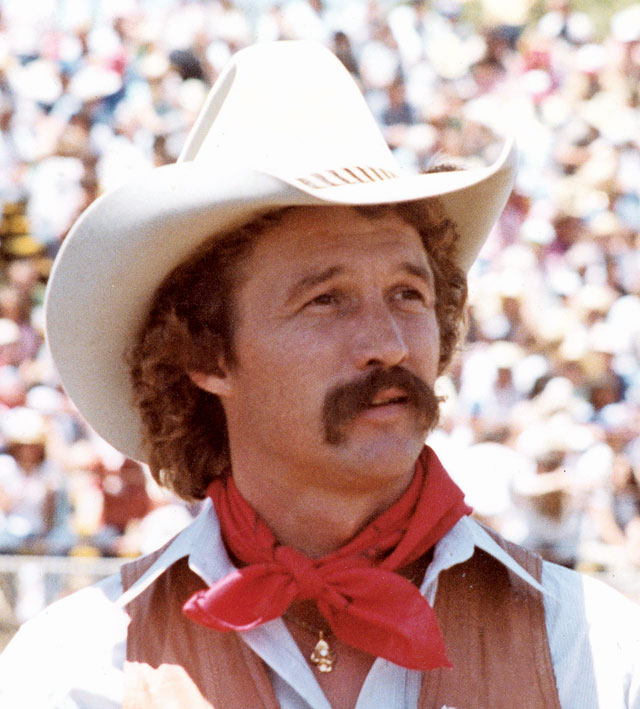
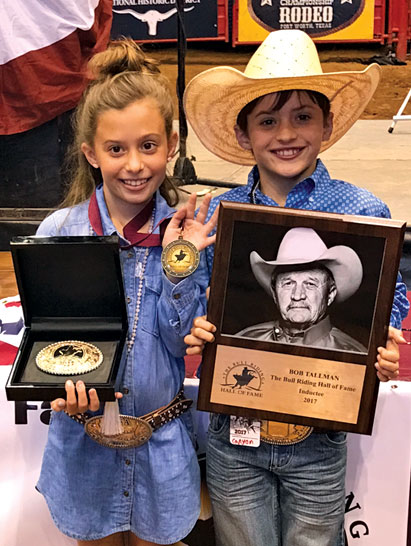
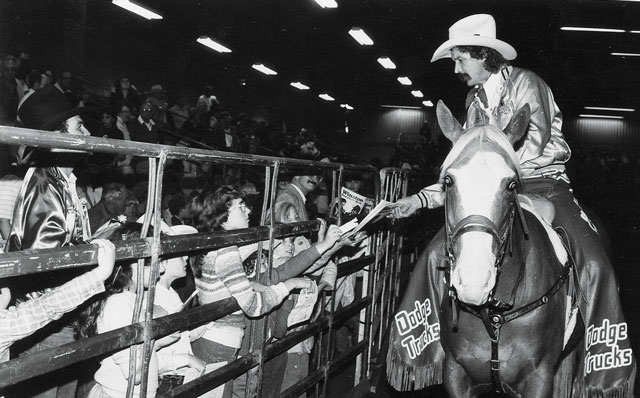
He also treats everyone, from the lowliest to the highest, the same. “The guy in the shoe shine stand, and the man who cleans the toilets, they are important.” He follows the example of his Lord in the dignity he gives people. “Jesus treated them the same.” He also helps anyone who asks. “His phone never stops ringing,” Kristen said. “He goes out of his way, no matter where he is, no matter who it is. He’ll answer and talk to a marketing person, for heaven’s sake. He’ll say, ‘what are you selling me today?’”
He’s never worked less than four jobs at a time, and he’s diversified beyond rodeo. He and Kristen run a cow/calf herd, the 3T Angus Cattle Ranch, which sells pasture-to-plate beef. He founded a surveillance company, Pro View Digital Surveillance, with thirty employees and offices around the nation. He also cuts radio ads, serving as the voice for Boot Barn, Kubota tractors in north Texas, Coors, and Dodge. “I never remember not working,” he said.
And he doesn’t plan on retiring, which “drives a lot of young announcers to drink,” he joked. “I ain’t weakening.”
He loves to work, he said, “and I don’t hang around people who don’t like work.” He’s optimistic about his businesses. “I do something every day, in the rodeo business, to make somebody smile and look good. I do something every day, in the surveillance business, that protects people, their families and assets. I do something every day, with the ranch raised black Angus beef, that’s lean and healthy to feed somebody’s family.”
People ask Kristen, is he like this all the time? “What you see at a rodeo is what I wake up to every morning,” she said. “What you see is what you get with Bob.”
She’s not surprised at Bob’s accomplishments. “When Bob does something, he gives 200,000 percent. There’s no halfway with Bob. When he decided this was what he was going to do, there was no doubt in my mind he would do it and be successful at it. And he didn’t have any breaks on the way. He did it all on his own.”
He and Kristen live 250 yards from their daughter and her husband, Daniel Pennell, and their twin grandkids, a boy, Canyon, and a girl, Cashly, who are ten years old. Daniel, an accomplished team roper, builds barns and fences. Nicole sells livestock insurance, and together they follow their kids through their activities: the boy as a roper, and the girl with her volleyball. Kristen often cooks dinner for the family, and they eat together two or three nights a week, and every Sunday night. “We never miss a Sunday night together,” Kristen said. “We’re a very close family.”
Bob and Kristen have been married 49 years, and Bob calls her “the toughest woman on the planet to put up with me.” He has supported her in whatever she has wanted to do, Kristen said. She used to travel with him, but doesn’t anymore, and he understands that. “He’s a very good man,” Kristen said.
Arachnoiditis has hampered Bob’s mobility in the last eight years, but like everything else in his life, he’s met it head on. It is an inflammation of the arachnoid lining in the brain and spinal cord, which causes intense pain and significant disability. Bob was told when he was diagnosed that he would be in a wheelchair in two years, but he isn’t. He has learned to compensate where needed, being careful with steps. He doesn’t let the disease bring him down. “If you dwell on your moments of negativity, that dwell will swell, and clog the view of your future. And if you’re looking for sympathy, buy a dictionary. It’s in there.”
In 2000, he established the Bob Tallman Charities. He raises funds through an annual golf tournament, called the Pasture Pool Classic, for the M.D. Anderson Cancer Children’s Cancer Hospital in Houston. He also hosts the Bob Tallman Wrangler National Finals Rodeo Charity Bowling Tournament, which is held each year during the National Finals. Funds raised from the bowling tournament go to benefit the Speedway Children’s Charities in southern Nevada and the Justin Cowboy Crisis Fund.
He is a past member of the Texas 4-H Foundation, and is involved with the Weatherford (Texas) Christian School, where his grandchildren attend. And he’s optimistic. The best part of life is still to come: “I haven’t gotten there yet.”
